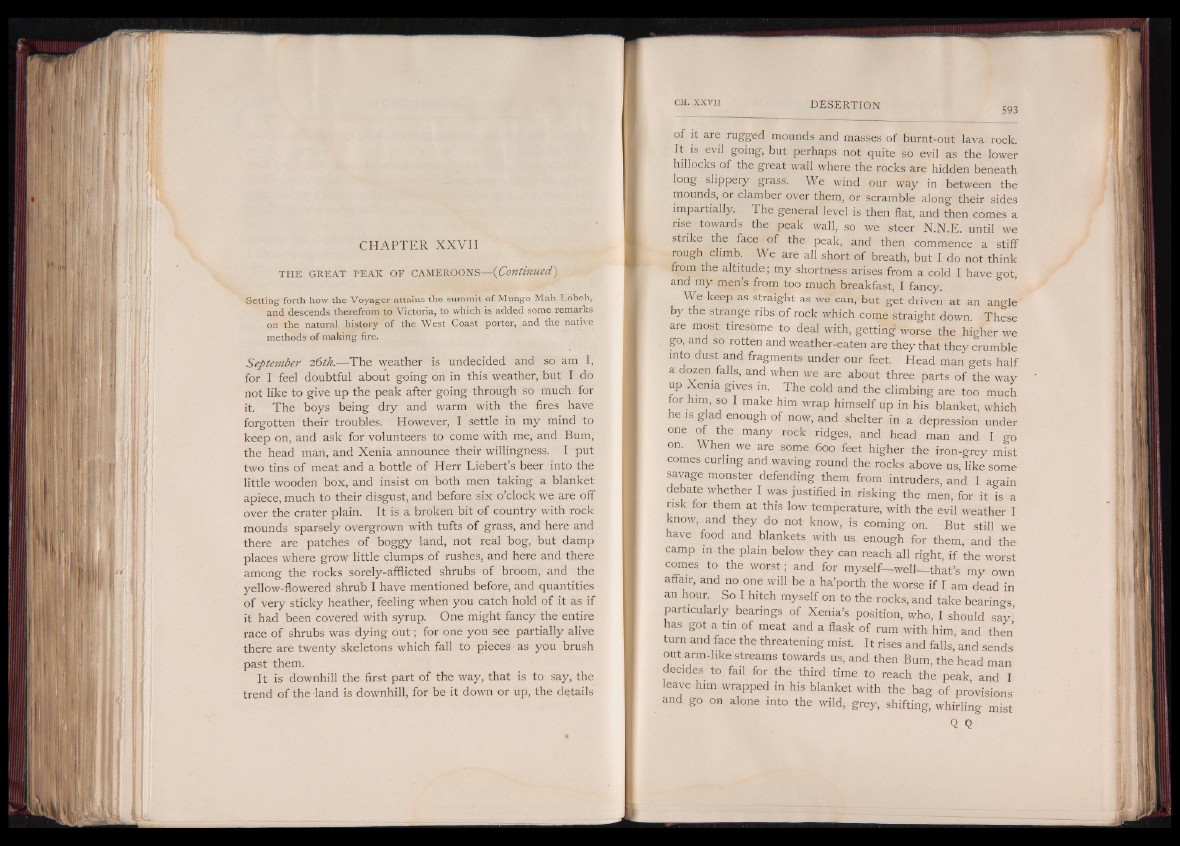
CH AP TER XX V II
THE GREAT PEAK OF CAMEROONS— (Continued)
Setting forth how the Voyager attains the summit of Mungo Mah Lobeh,
and descends therefrom to Victoria, to which is added some remarks
on the natural history of the West Coast porter, and the native
methods of making fire.
September 26^.p-The weather is undecided and so am I,
for I feel doubtful about going on in this weather, but I do
not like to give up the peak after going through so much for
it. The boys being dry and warm with the fires have
forgotten their troubles. However, I settle in my mind to
keep on, and ask for volunteers to come with me, and Bum,
the head man, and Xenia announce their willingness. I put
two tins of meat and a bottle of Herr Liebert’s beer into the
little wooden box, and insist on both men taking a blanket
apiece, much to their disgust, and before six o’clock we are off
over the crater plain. It is a broken bit of country with rock
mounds sparsely overgrown with tufts of grass, and here and
there are patches of boggy land, not real bog, but damp
places where grow little clumps of rushes, and here and there
among the rocks sorely-afflicted shrubs of broom, and the
yellow-flowered shrub I have mentioned before, and quantities
of very sticky heather, feeling when you catch hold of it as if
it had been covered with syrup. One might fancy the entire
race of shrubs was dying o u t; for one you see partially alive
there are twenty skeletons which fall to pieces as you brush
past them.
It is downhill the first part of the way, that is to say, the
trend of the land is downhill, for be it down or up, the details
of it are rugged mounds and masses of burnt-out lava rock.
It is evil going, but perhaps not quite so evil as the lower
hillocks of the great wall where the rocks are hidden beneath
long slippery grass. We wind our way in between the
mounds, or clamber over them, or scramble along their sides
impartially. The general level is then flat, and then comes a
rise towards the peak wall, so we steer N.N.E. until we
strike the face of the peak, and then commence a stiff
rough climb. We are all short of breath, but I do not think
from the altitude; my shortness arises from a cold I have got
and my men’s from too much breakfast, I fancy.
We keep as straight as we can, but get driven at an angle
by the strange ribs of rock which come straight down. These
are most tiresome to deal with, getting worse the higher we
go, and so rotten and weather-eaten are they that they crumble
into dust and fragments under our feet. Head man gets half
a dozen falls, and when we are about three parts of the way
up Xenia gives m. The cold and the climbing are too much
for him, so I make him wrap himself up in his blanket, which
he is glad enough of now, and shelter in a depression under
one of the many rock ridges, and head man and I go
on. When we are some 600 feet higher the iron-grey mist
comes curling and waving round the rocks above us, like some
savage monster defending them from intruders, and I again
debate whether I was justified in risking the men, for it is a
risk for them at this low temperature, with the evil weather I
now, and they do not know, is coming on. But still we
have food and blankets with us enough for them, and the
camp in the plain below they can reach all right, if the worst
comes to the worst; and for myself— well— that’s my own
affair, and no one will be a ha’porth the worse if I am dead in
an hour. So I hitch myself on to the rocks, and take bearings
particularly bearings of Xenia’s position, who, I should say'
has got a tin of meat and a flask of rum with him, and then
turn and face the threatening mist. It rises and falls, and sends
out arm-hke streams towards us, and then Bum, the head man
decides to fail for the third time to reach the peak and I
leave him wrapped in his blanket with the bag of provisions
and go on alone into the wild, grey, shifting, whirling mist
Q Q